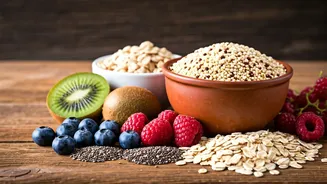Fiber's Gut Connection
Fiber plays a crucial role in maintaining a healthy gut. It is a type of carbohydrate that the body cannot digest, making it a key component for digestion
and nutrient absorption. As it moves through the digestive system, fiber adds bulk to stools, preventing constipation and ensuring the regular elimination of waste. Furthermore, fiber acts as a food source for beneficial gut bacteria, promoting their growth and contributing to a balanced gut microbiome. The diversity and abundance of these bacteria are associated with various health benefits, including enhanced immunity and improved mental health. Incorporating adequate fiber into the diet can therefore improve digestion and contribute to overall health and well-being.
Apples' Digestive Power
Apples are a great source of fiber, particularly soluble fiber called pectin. Pectin is known for its ability to form a gel-like substance in the digestive tract, aiding in the slowing down of digestion and helping regulate blood sugar levels. This can promote a feeling of fullness and support healthy weight management. Apples also contain antioxidants, which combat oxidative stress in the body. When choosing apples, it is important to include the skin, as it contains a significant portion of the fiber content. Eating apples regularly can support the digestive system and contribute to overall health, making them a valuable addition to any diet focused on gut health.
Berries: Tiny Giants
Berries such as blueberries, raspberries, and strawberries are packed with fiber and antioxidants, which contribute to the support of gut health. These small fruits offer a significant amount of both soluble and insoluble fiber. Insoluble fiber aids in the smooth passage of food through the digestive tract, helping prevent constipation. Soluble fiber, on the other hand, helps to feed the beneficial bacteria in the gut, thereby supporting a balanced microbiome. The antioxidants found in berries also help to reduce inflammation and protect the gut lining from damage. Incorporating berries into your diet is a delicious and beneficial way to increase your fiber intake and support a healthy digestive system.
Lentils' Fiber Benefits
Lentils are a great plant-based source of fiber, and they also provide a significant amount of protein and other essential nutrients. They are rich in both soluble and insoluble fiber, making them a powerful food for maintaining gut health. Soluble fiber helps feed the beneficial bacteria in the gut, which supports a balanced gut microbiome, while insoluble fiber adds bulk to stools and aids in regular bowel movements. Lentils are also relatively easy to prepare, making them a practical and versatile addition to any diet. Adding lentils to meals can provide a sustained feeling of fullness, which can help with weight management. The combination of nutrients makes lentils a valuable food for supporting digestive health and overall well-being.
Avocados and Fiber
Avocados are known for their healthy fats, but they are also a good source of fiber. The fiber in avocados helps promote regular bowel movements and can contribute to a feeling of fullness, which may support weight management. Additionally, avocados contain a variety of vitamins and minerals. The fiber content in avocados makes them beneficial for the digestive system. Integrating avocados into your diet provides a rich source of nutrients that can support digestive health and overall well-being. Their versatility allows them to be incorporated into various meals, offering a convenient way to boost your fiber intake and improve gut health.












